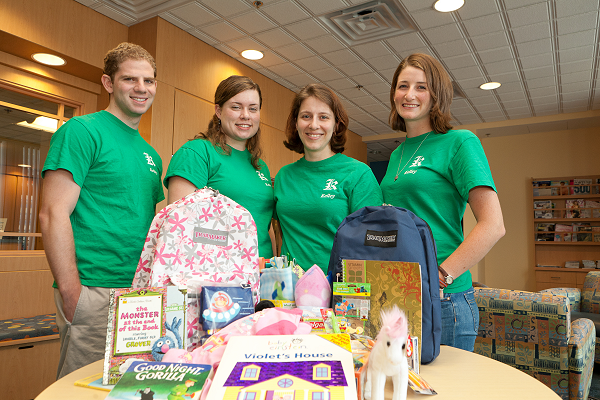 Kelley Backpacks volunteers, from left to right, Scott Pascal, Alison Little, Heather Busick and Anne Barnard, with some backpacks and a sampling of items that fill them. |
When fourth-year medical student Heather Busick was completing her psychiatry rotation, she began wondering about the fate of pediatric patients who were hospitalized without their parents, destined to be discharged into the Department of Children and Families care. As a parent of two young children herself, she was struck by how alone such children must feel and wondered if she could do something—just one small thing—to make them feel better.
A little less than a year and lots of research and planning later, Busick and a group of her fellow medical students have launched the Kelley Backpacks program, which will give each child who transitions into state care from UMass Memorial Children’s Medical Center and the Pediatric Emergency Department something small to call his or her own.
The goal of the program is to provide each child with a backpack loaded with age- and gender-appropriate items such as books, stickers, games, hair accessories, toothbrushes, pajamas, blankets and stuffed animals. The program was launched at the beginning of July with 12 backpacks—two each for six age ranges—ready and waiting to be given to the right child.
|
Kelley Backpacks volunteers:
|
In planning for the launch, Busick, who is connected with the Kelley House learning community, reached out to other Kelley House students to see about the possibility of establishing a house affiliation that would lend legitimacy to the project. She suggested that the program become a signature Kelley House project and enlisted volunteers skilled in (or willing to learn) fund-raising, organizing and bookkeeping. She also needed volunteers willing to pitch in with pager duty to respond to calls alerting organizers that a child was in need of a backpack.
Donations of items for the backpacks have come from many sources and through word of mouth. When Busick approached Rob Wing, director of the Child Life Program at UMass Memorial Children’s Medical Center, he offered surplus items he had on hand. When Busick approached Hugh Silk, MD, clinical associate professor of family medicine & community health, he put her in touch with a local dentist who donated toothbrushes and toothpaste suitable for all age ranges. Baby formula was donated by an OB in Milton whom Busick knows. With money raised through a bake sale and from a grant by the Worcester Rotary Club, the actual backpacks were purchased. “We estimate that we’ll need an annual budget of about $3,800 to put together about 60 backpacks,” Busick said, basing the costs on conversations she had with a patient case manager and an ED case manager.
Busick hopes Kelley Backpacks will become a longitudinal project that students behind her and current volunteers will make their own. She also hopes to incorporate an academic research component that will measure outcomes and use the backpacks as a learning resource for the recipients by including educational materials related to the contents.
“I really want this to be a legacy project, to leave something of myself behind,” said Busick. “I also want to empower the other volunteers to carry the project into the future and make it their own.”
If you would like to donate funds or goods to Kelley Backpacks, send an email to Scott Pascal at scott.pascal@umassmed.edu
Editor’s Update, Dec. 28, 2011: Busick reports that the group has given out 13 backpacks since the program launched in July. About half have gone to children 2 years old or younger. To receive newsletter updates or to find out how to make monetary donations or donations of goods to the program, e-mail Kelleybackpacks@gmail.com.
The group is accepting donations of new or “good as new” items at a collection box in the Department of Family Medicine waiting area on the first floor of the Benedict Building. Busick reports they are always in need of backpacks, pajamas, clothing (under and outer wear) in all sizes. They also take games, toys, personal hygiene items, books, notebooks, pencils/crayons/pens/markers, arts and crafts supplies, diapers and formula.